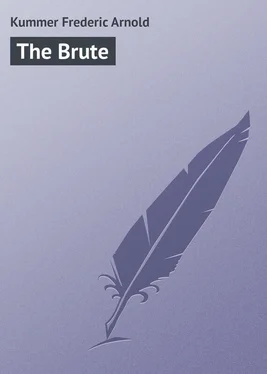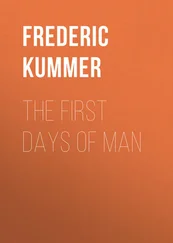Frederic Kummer - The Brute
Здесь есть возможность читать онлайн «Frederic Kummer - The Brute» — ознакомительный отрывок электронной книги совершенно бесплатно, а после прочтения отрывка купить полную версию. В некоторых случаях можно слушать аудио, скачать через торрент в формате fb2 и присутствует краткое содержание. Жанр: foreign_prose, на английском языке. Описание произведения, (предисловие) а так же отзывы посетителей доступны на портале библиотеки ЛибКат.
- Название:The Brute
- Автор:
- Жанр:
- Год:неизвестен
- ISBN:нет данных
- Рейтинг книги:3 / 5. Голосов: 1
-
Избранное:Добавить в избранное
- Отзывы:
-
Ваша оценка:
- 60
- 1
- 2
- 3
- 4
- 5
The Brute: краткое содержание, описание и аннотация
Предлагаем к чтению аннотацию, описание, краткое содержание или предисловие (зависит от того, что написал сам автор книги «The Brute»). Если вы не нашли необходимую информацию о книге — напишите в комментариях, мы постараемся отыскать её.
The Brute — читать онлайн ознакомительный отрывок
Ниже представлен текст книги, разбитый по страницам. Система сохранения места последней прочитанной страницы, позволяет с удобством читать онлайн бесплатно книгу «The Brute», без необходимости каждый раз заново искать на чём Вы остановились. Поставьте закладку, и сможете в любой момент перейти на страницу, на которой закончили чтение.
Интервал:
Закладка:
CHAPTER V
It was early in March that West came to New York, and from then on Edith Rogers lived what was to her a new life. She had persuaded Donald to let her have a nurse for Bobbie, a young girl who came in every morning, took the child out in the park, amused him during the day, and helped with the housework. This left her comparatively free to spend a large part of her time with West. Their automobile trips became a matter of almost daily occurrence.
Thrown thus so much together, these two closed their eyes to the danger which they both knew was impending; they walked gayly upon the edge of a yawning chasm and refused to admit that one false step would send them both crashing down into an abyss of chaos and destruction. In a few weeks, from talking first of themselves, then of each other, during long days when Donald labored patiently in his office down-town, it was but a question of time when “you” and “me” became “we,” and Edith would have missed Billy West from her life more than she would have missed Donald, because he had become more a part of it. Like a ship at anchor, with all sails set and filled by a strong and ever increasing gale, it was inevitably certain that before long either the anchor must give, or the white sails of her reputation be blown to rags and tatters – bitter state, indeed, for a wife and mother!
One of the things about West which appealed to her most was his ever ready sympathy. Donald, made of sterner stuff, realized that sympathy, overdone, weakens one’s powers of resistance, and exaggerates one’s burdens. He expected his wife to bear what life accorded to her in the way of hardship as patiently as he himself did. West, on the contrary, was always sympathetic. Edith’s cares, her worries, her troubles, he at once made his own, and seemed only content if he could in some way relieve them. That he had the means to do so, and could not, made it all the harder for him. He would have given her anything he possessed, yet knew she could accept only the veriest trifles. Flowers, theater tickets, automobile rides, served to intensify, rather than lessen, her longings for the things she must perforce do without. Expensive restaurants implied expensive costumes, hats, jewels, which she did not have and could not get, and she often wondered that her companion did not feel ashamed of her in her home-made clothes.
By some system of more-than-rigid economy known only to herself she had managed to procure a few of the things she felt she most needed: a long automobile coat – reduced because shop-worn – a motor hat and veil, and an evening gown which had once been part of the theatrical outfit of a well-known star, and which she had picked up, second-hand, at a little shop on Sixth Avenue. It was very magnificent; she felt almost ashamed to wear it so often, but she knew that it showed off her charms to the greatest advantage, having been designed, primarily, with that end in view. Had she ever stopped to ask herself why she wanted to exhibit these charms to West she would probably have been unable to answer her own question, but she had long ago ceased to catechize herself – sufficient it was that Billy was pleased that she looked well, and that Donald did not blame her. She was floating happily along from day to day, not daring to ask herself what the outcome of it all would be.
She was seldom alone with West – alone, that is, in the sense of being to themselves. She had not dared, after that first night, to have him at the apartment – they had met at the doorstep, and their hours together were spent over restaurant tables, or in theater seats, or the automobile. She had a terrible fear that some time or other West would reach out his arms to her and she knew that, if he did, she would go to him without a question. He had assisted her in avoiding such a contretemps , for he, too, knew his power, and was fighting to hold what he had, rather than lose it in a vague and mysterious future, at the character of which he could only guess. On one or two occasions, when they had come in from automobiling, and West was waiting until Donald should arrive from the office, preparatory to their all going to dinner together, she had purposely brought Bobbie into the room. Once when they had so come in, Bobbie was out with his nurse, and she had wondered if Billy would take advantage of the fact. Much as she feared it, she was conscious of a fierce hope that he would. These two were like firebrands – he longed in every fiber to take her into his arms and kiss her, and she knew it. She equally hungered for his embraces, and he knew that this was so; in both their minds this maddening thought had become a reality – a thousand times. She had acted it to herself over and over, as he had done, and had felt, in her imagination, every thrill of delight which this physical contact would give her, yet something, some leash of conscience as yet not worn to the breaking point, held them apart.
On this particular occasion he sat far from her, and held on to his half-smoked cigar as though it had been his salvation. She busied herself turning idly the leaves of a magazine. He knew, if he threw that cigar away, he would go over to her and take her in his arms, and kiss her, and he dared not to do it – for fear of what might come thereafter.
In April, he had been obliged to go away for three weeks, in connection with some business affairs in the West, and the separation had come almost as a relief to both of them. They had endured as far as human flesh and blood could endure. West told her of the matters which made it necessary for him to go, but she felt that they were not so important as he represented, and knew in her heart that he was going away because he wanted to give both himself and her an opportunity to readjust themselves, to think matters over calmly, without the presence of each other to affect their judgment.
The time of his absence seemed interminably long. Edith found that most of the long series of introspective analyses to which she subjected herself terminated in a mad desire to have him back again in New York. His absence had shown her how absolutely she had been depending upon him, how his going had taken from her everything that made her life joyous and happy, leaving only the dull background of duty and work, two things that she had come to regard merely as unfortunate necessities of existence.
During his absence she spent a great deal more time with Bobbie than she had been in the habit of doing of late, and found to her surprise that the child depended upon her and thought of her less than he had done before. His nurse was a kind-hearted young girl, who had come to love the little boy deeply and mothered him in all sorts of ways. He had got out of the habit of seeing his mother all day as he had done in the past and, with the easy forgetfulness of childhood, clamored for Nellie, as the girl was called, and their daily walks in the park, the games she had thought out to amuse him, the easy comradeship that made her his playfellow rather than a superior and distant grown-up. Edith resented this, at first, but soon ceased her attempts to change matters and busied herself in making dresses for the coming summer.
She saw West again on a drizzly afternoon in May. His frequent letters had told her of his life while away and of the day of his return. He had called rather unexpectedly about three o’clock, and they had gone for a walk in the park. He seemed strangely silent, at first, and neither of them spoke much for a few moments; they walked along side by side, inwardly trying to bridge the gap which the past few weeks had made in their lives. Presently he spoke.
“I cannot tell you how glad I am to be back again. I used to like the West, but I do not think I could ever live there again.”
She said what was nearest her heart. “I am glad, too – very glad,” then grew confused and silent.
Читать дальшеИнтервал:
Закладка:
Похожие книги на «The Brute»
Представляем Вашему вниманию похожие книги на «The Brute» списком для выбора. Мы отобрали схожую по названию и смыслу литературу в надежде предоставить читателям больше вариантов отыскать новые, интересные, ещё непрочитанные произведения.
Обсуждение, отзывы о книге «The Brute» и просто собственные мнения читателей. Оставьте ваши комментарии, напишите, что Вы думаете о произведении, его смысле или главных героях. Укажите что конкретно понравилось, а что нет, и почему Вы так считаете.












